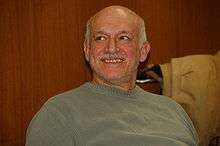Michael Klonsky
| Michael Klonsky | |
|---|---|
 Mike Klonsky speaking at Loyola University, Chicago, 2007. |
Michael Klonsky (born 1943) is an American educator, author,[1] and political activist. He is known for his work with the Students for a Democratic Society, the New Communist Movement, and, later, the small schools movement.
Political activism
Klonsky's father, Robert Klonsky, a World War II veteran who fought as a volunteer against the Nationalists during the Spanish Civil War, had been arrested and convicted of "conspiring to advocate Marxist views" in violation of the Smith Act during the McCarthy period.[2] The Supreme Court later overturned the case.
In the late 1960s Michael Klonsky became the national secretary of the Students for a Democratic Society,[3] which he joined as a student at San Fernando Valley State College (now California State University, Northridge).[4] He was one of five S.D.S. members arrested on May 12, 1969, when prank phone calls sent police and firefighters to the S.D.S. offices in Chicago.[3]
In the 1970s he became a leader of the New Communist Movement which broke with the older Communist Party USA and its allegiance to the Soviet Union. He headed the Communist Party (Marxist-Leninist),[5] in which role he was one of the first U.S. political activists to visit the People's Republic of China.[5][6] Klonsky later became critical of Marxist dogma but stayed active in civil rights, anti-war and educational reform politics.
Education research
Klonsky became one of the leaders of the modern small schools movement which has done much to transform the face of secondary school education in the United State. His academic work focused on small school size as a solution to the problems of inner city schools; his early research[7] on issues of school size and its impact on student achievement, school violence, and dropout rates, helped pave the way towards the development of thousands of new small and charter schools across the country. By 1996, he was the director of the Small Schools Workshop at the University of Illinois, Chicago,[8] and in 1999, he was named by president Bill Clinton to the Academic Advisory Council of the National Campaign Against Youth Violence, where he advocated small schools as a mechanism for violence reduction.[9] Klonsky is now a retired professor of education after teaching at several universities, including UIC[10] and the Fischler School of Education at Nova Southeastern University.[11]
References
- ↑ Klonsky, Michael (2008), Small Schools: Public School Reform Meets the Ownership Society, Routledge, ISBN 978-0-415-96123-3.
- ↑ "9 Philadelphians Convicted as Reds; Leaders Found Guilty of Plot to Overthrow Government – Trial Ran for 71 Days", New York Times, August 14, 1954.
- 1 2 Janson, Donald (May 13, 1969), "5 in S.D.S. Seized by Chicago Police; Scuffle Occurs as Officers Answer False Alarm", New York Times.
- ↑ Moreland, Pamela (April 22, 1988), "Legacy of Turmoil: CSUN Looks Back at Years of Activism at Former Valley State College", Los Angeles Times.
- 1 2 "Westerners Meet Chairman Hua", New York Times, August 26, 1977.
- ↑ Mathews, Jay (September 7, 1977), "China Rolls Out Red Carpet for Tiny Pro-Peking Groups", Los Angeles Times.
- ↑ Klonsky, Michael (1995), Small Schools: The Numbers Tell a Story. A Review of the Research and Current Experiences, The Small Schools Workshop.
- ↑ Rossi, Rosalind (August 30, 1996), "Small schools under microscope", Chicago Sun-Times, (subscription required (help)).
- ↑ "Violence expert says make schools much smaller", Chicago Defender, January 3, 2000, (subscription required (help)).
- ↑ Bruce, Allison L. (July 28, 2003), "Small schools within large schools help students focus", Charleston Post and Courier.
- ↑ "Comings & Goings", Catalyst Chicago, May 1, 2006, (subscription required (help)),
Michael Klonsky, director of the Small Schools Network, was named a visiting professor at Nova Southeastern University's Fischler School of Education and Human Services in North Miami Beach, Fla. He will maintain his position at the Small Schools Network.